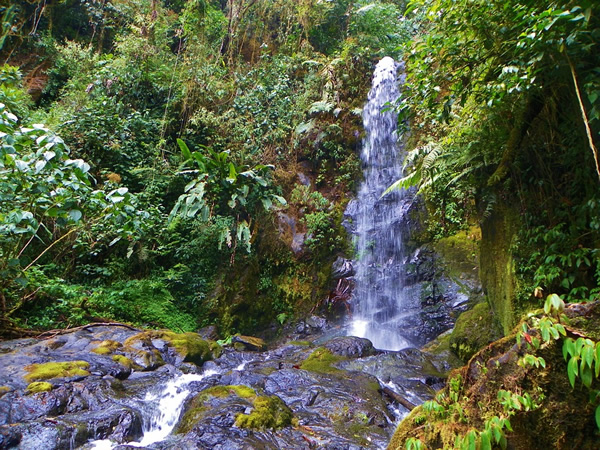Living Abroad in Costa Rica
How to
Assess Opportunities
By Leah Dobkin

|
|
One of the many lush experiences for all the senses in Costa Rica.
|
Costa Rica provides a unique option for retirees and others who are not interested in quitting working altogether. Many aging baby boomers have a wide range of working opportunities in tourism, small business development, etc. In other words, retirees can easily take their work experience and apply it in this community on a part-time basis.
Medical expenses are often a fraction of what they cost in the United States. There are several health insurance options in Costa Rica, some better than others, such that many medical procedures are cheaper than in the U.S., and there is a long history of medical tourism. If you do your research, healthcare can be a deal.
Avoiding the Pitfalls
Costa Rica has a dynamic housing market filled with attractive housing opportunities and serious pitfalls. When considering living in Costa Rica keep the following tips in mind:
-
The number one recommendation for a happy life in Costa Rica is to rent before you buy. Live in different areas, and experience both the dry and rainy seasons. Interview local people. Don’t underestimate the power of local knowledge.
-
Become familiar with the laws, hire a reputable lawyer to help you navigate through literally unfamiliar territory, and conduct a thorough due diligence process. People have sold the same property to more than one gringo, or sold land without proper title or access. Also, it is prohibited to build within the first 50 meters of the high-tide line, nor within the next 50 to 200 meters unless there is existing housing. If you do build within 200 meters of the high-tide line, you can only lease the land from the government.
-
Have someone watch your property while you are gone, such as a housesitter (gated communities are an option, but not ideal for cultural immersion). Squatters are allowed to take your property if they reside there three or more years. There have also been cases where people have forged a person’s name and confiscated other peoples’ property for a bribe.
-
There are numerous benefits to purchasing your property in the name of a separate company, such as asset protection, avoiding transfer tax, and probate.
-
Look for a reasonably honest developer if you go for a newer house or condo. There are a lot of fly-by-nights or inexperienced developers who run out of money, and all you ’ll have is a pretty gate at the entrance of the development. Make sure the developer has a good track record, and that the development itself has the entire infrastructure in place such as electricity and roads. Paved is nice, but don’t expect it. Be sure there are phone lines and an adequate water supply.
Stretching Your Colones
Costa Rica is touted as a bargain, but I was surprised by how expensive it is. Expatriates have told me there are two economies: one for Ticos (Costa Ricans) and the other for gringos (expatriates). Gringos are charged considerably more for products and services. To stretch your dollars do the following:
-
Learn Spanish: the expatriates who do are in a better position to negotiate costs, enjoy and more fully fit into the culture, and make more friends.
-
Initiate service-providing business opportunities targeted toward tourists and expatriates.
-
Avoid areas with high concentrations of North Americans; prices go up there.
-
Buy properties during preconstruction or construction phases to lower the purchase price and maximize appreciation.
-
Always get a price ahead of time, and don’t feel uncomfortable negotiating prices. It is part of the culture.
-
Get rid of the “shop until you drop” mentality. Bartering, house sitting, and doing without imported brand-name foods and instead eating local products and buying fresh foods in bulk at local markets can stretch your dollars and enable you to live within $1,000 to $2,500 a month very comfortably.
Costa Rica is Not for Everyone
North Americans and Europeans are flocking to Costa Rica because of its beauty and biodiversity, peaceful lifestyle, stable democratic government, and growing economy. However, living in Costa Rica is not for everyone and requires an adventure-seeking spirit, good health, and mobility. You cannot be afraid of bugs, snakes, and crocodiles. There are potholes to cross, steps to climb, and a very different culture to embrace. Lack of efficiency and amenities can be a big adjustment. “Tico time” is more flexible than “gringo time.” Costa Rica is a developing country, not a developed country, and expectations have to reflect this fact.
One has to slow down and smell the ficas. But you also have to be a self-starter; someone with lots of hobbies and interests. Otherwise, you can slip into the bar stool culture of some expatriates.
Most of all, you need to maintain your common sense. Many expatriates lose their common sense, fall in love with the place, and blindly put down their hard earned money for an unrealistic slice of Shangri-La. Expatriate Pam Ellsworth said, “Retire to Costa Rica and enjoy the beauty, but paradise doesn’t mean you should go brain dead.”
Leah Dobkin is a freelance writer and a national consultant and public speaker about senior housing, corporate elder care, and resource development with nonprofits.
|
